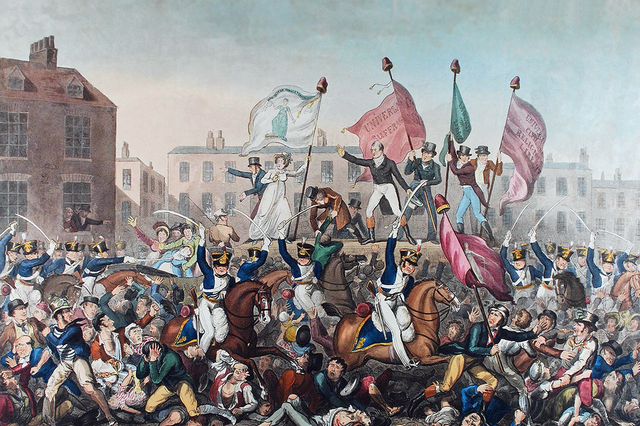
The Peterloo Massacre
The early 1800s saw numerous demonstrations by working people, particularly in the north of England, as they protested about their treatment and demanded change to their working lives. On the 16th of August 1819, one such demonstration took place at St. Peter’s Fields in Manchester, as people demanded a voice in parliament. At that time, only 2% of British people had the right to vote and the regions in the north were particularly poorly represented. Tens of thousands of people attended what was a peaceful demonstration and, despite the seriousness of the cause, it is said that there was a happy party atmosphere at the gathering – men, women and children dressed in their best clothes as they marched towards Manchester, accompanied by bands and dancers.
Cavalry Induce Panic
Despite the happy and peaceful atmosphere, local magistrates were concerned about the size of the gathering, claiming that the crowd had violent revolutionary intentions. With this in their minds, they called for the arrest of Henry Hunt, the organiser of the demonstration. Armed cavalry soldiers were dispatched to arrest Hunt and the other organisers and disperse the crowd. They took a greatly overzealous approach to doing so. With swords drawn, they charged into the crowd, slashing at protesters. Panic ensued and many people were trampled to the ground as they tried to escape.
The Peterloo Massacre Was Premeditated
It was later found that the soldiers had sharpened their sabres before the event, premeditating the violence that occurred. Between 10 and 15 people were killed that day and around six hundred injured, some very seriously. The incident became known as the Peterloo Massacre, bitterly mocking the soldiers who had attacked unarmed citizens by comparing them to the heroes who had recently fought at the Battle of Waterloo.
The Repercussions
The incident aroused a great deal of anger from the public but instead of supporting the protesters, the government passed a new law called the Six Acts which was designed to prevent protests of this type occurring again in the future; this included restrictions on print media. Despite this, the actions surrounding the Peterloo Massacre helped herald in the Great Reform Act of 1832, which gave many northern industrial towns a voice in parliament.